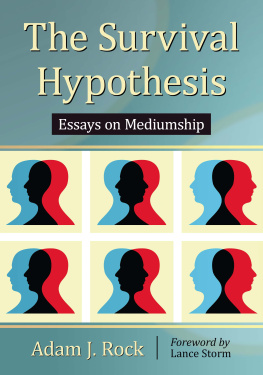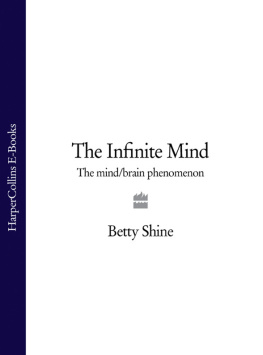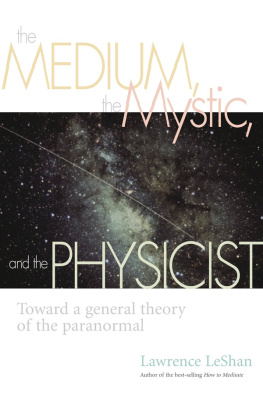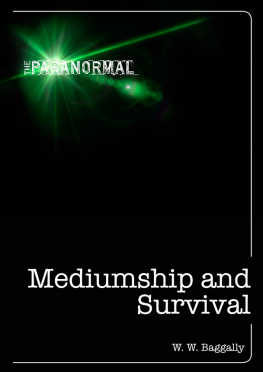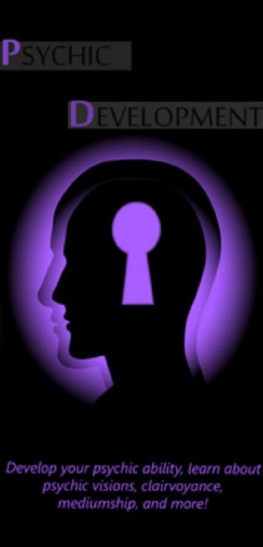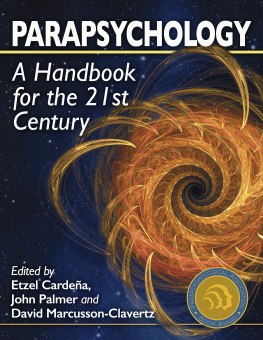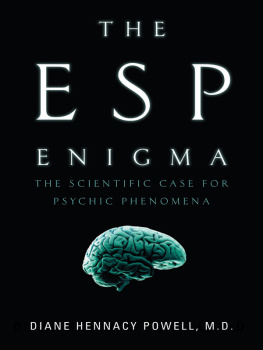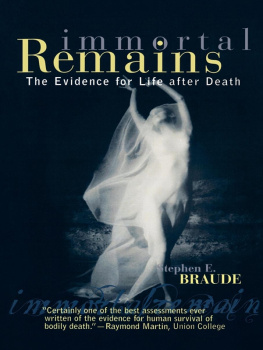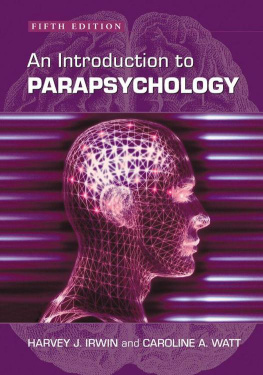
The Survival Hypothesis
Essays on Mediumship
ADAM J. ROCK

McFarland & Company, Inc., Publishers
Jefferson, North Carolina
LIBRARY OF CONGRESS CATALOGUING DATA ARE AVAILABLE
BRITISH LIBRARY CATALOGUING DATA ARE AVAILABLE
e-ISBN: 978-1-4766-1442-7
2013 Adam J. Rock. All rights reserved
No part of this book may be reproduced or transmitted in any form or by any means, electronic or mechanical, including photocopying or recording, or by any information storage and retrieval system, without permission in writing from the publisher.
Front cover image iStock/Thinkstock
McFarland & Company, Inc., Publishers
Box 611, Jefferson, North Carolina 28640
www.mcfarlandpub.com
This book is dedicated to the memory of Colin Eric Harris (July 21, 1950January 27, 2012).
A peaceful and gentle man, he did not consider himself courageous. But he faced death, arguably mans greatest fear, with acceptance, peace and valor. To his family left behind, this was a true act of courage and he will always be our hero.Kylie Harris, for Adam J. Rock
Foreword
LANCE STORM
I was invited by Dr. Adam J. Rock to contribute a foreword to his intriguing book The Survival Hypothesis: Essays on Mediumship. After I made a comprehensive review of this impressive collection, coming to fruition as it did from the worthy efforts of a team of renowned professionals, I could hardly refuse the opportunity, or the honor, to be part of such a major project. But it wasnt just the subject matter, or the cast of experts that drew me to accepting Adams offer, for this work would never have seen the light of day without his discriminative guidance. In short, I was confident that Adam would deliver the goods.
Ultimately, of course, there are always risks associated with the venture of editing a collection of essays (I speak from experience)the question that looms largest is, How will the book be received? Well, I am no psychic, but I have no doubt that only favorable verdicts will result, for The Survival Hypothesis is so rich in content, and surprisingly broad in its scope, to the degree that it is transcendent of the parapsychological topic of mediumship, extending and necessarily incorporating strongly related and overlapping themes and ideas from psychology, psychotherapy, philosophy, anthropology, and even neuroscience. Readers should not be dismayed or intimidated by these seemingly high-brow multi-disciplinary and disciplined approachesthe material is clear and easy to follow. But for all that clarity and ease, the most discretionary and astute, even critical, of academics may still find their past understandings and taken-for-granted assumptions challenged by the 18 essays that follow my foreword. May it be so for science would never advance if it were otherwise.
So now let me present an overview of the book to whet the readers appetite (I will not go into detail, and space prohibits that I be anything but representative). First up, the introduction sets us off on a journey through the history of mediumship phenomena and describes the types of mediumship and sources of psi. This last topic is invariably taken up and extended in the next two essays (see the chapters by Braude and by Sudduth), in the guise of the survival/super-psi debatea personal favorite of mine. I dont wish to give anything away, so I will only say that Stephen S. Braudes chapter, followed by Michael Sudduths chapter, are admirably written, well-argued, and thought-provoking. Nor do I wish to plant any ideas in the dear readers head, for parapsychology probably has far to go yet before any firm conclusions can be drawn. As far as theory goessuper-psi or survival?lets not forget that the human mental agility required by one theory is as equally challenging to the emotions and the intellect as the multi-dimensionality implied in the other. Accordingly, as solid and convincing as Braude and Sudduth are in their discussions, they both wisely present their ideas with due caution. And justly so, for, given the next three essays from Christopher A. Roe and Elizabeth C. Roxburgh, Krissy Wilson, and Tony Jinks, we see that there is good cause to dismiss much of the claims of many mediums anyway.
Skeptical readers might wonder (once they have come that far in the book), if much to do with mediumship and its purpose can be explained in normal terms, why bother with paranormal claims? The simple answer is borne in my preceding sentence; mediumship phenomena, like the afterlife, extra-sensory perception, and psychokinesis, are not completely explainedmuch that is still in need of serious attention tends to get swept under the rug where it nevertheless sticks up (to continue the metaphor) as bumps not too small for the astute observer to overlook. More than that, some essays in The Survival Hypothesis (especially those by Joan H.Hageman and Stanley Krippner; Jacob Kaminker; Rafael G. Locke; and Julio F.P. Peres, Alexander Moreira-Almeida and Leonardo Caixeta) raise other concerns, and they even function in the same way as do cautionary tales in the fictional realm of literaturefor example, researchers out there need to start looking with an unbiased (some may say post-modern) eye at how they conduct their studies and, more particularly, how they define their entities and constructs, and how they depend on the models that drive their assertions.
Another examplethe field of so-called anomalistic psychology: a field notably enmeshed with mainstream psychology, and notoriously devoted (at least primarily) to psychologizing and psycho-pathologizing parapsychological phenomena and experience. (Readers should note the harshness of my criticism to follow is rivaled only by the open hostility that I, and many of my colleagues, have endured over the years by our so-called peers.) We must now recognize what appears to be a growing conspiracy (not just in universities) where the aims are: (a) to argue and demonstrate, by any means necessary (e.g., omissions and half-truths in scientific papers) and, by way of institutional policy, to ban or deny psi research and its subsequent publications, in order to convince nave academics and a non-thinking public that there is, and can be, no such thing as psi, and therefore (b) show that paranormal belief and alleged experience can never be healthy or normal, but must be pathological or delusional. Through ostracization and peer pressure, and occasional success in aims (a) and (b) which work in harmony, this sweeping and prejudicial agenda is reinforced. In the very sciences we witness the contents of the ubiquitous mythological depths of our unconscious enlivened in the all too lofty realms of a science led by practitioners who are supposed to be dispassionate. Even the centuries-old Enlightenment thinking that guides modern science has a Luciferian aspect that has yielded a science with a Hyde-like persona. This more-than-fictional character, inflated with itself and its ironically darker accomplishments, is invariably, inevitably, destined for a fall. By a fall, I dont mean there is any fear that the world will abandon science altogetherit has come too far and been too successful for thatbut we must realize that everything we do has a darker side with accompanying consequences.
Having said that, there is that darker side to parapsychology too, and maybe that tacit understanding in the masses, and the skeptical academia of which I am so critical, drives the fear of the paranormal, for if psi is real, and we reach some semblance of mastery over it, how will it all end for us? I agree we may be in a bind. Do I paint too grim a picture? Indeed, I may seem too critical of institutions and individuals in my points (a) and (b) above, even though I speak from experience, not conjecture. But what of the brighter side of
Next page
